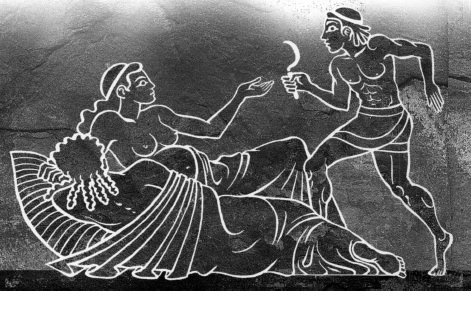Gaia
Publié le 17/01/2022

Extrait du document

Gaia (Gaea, Ge; Earth) Greek The personification
of the Earth Mother in Greek mythology;
known to the Romans as Tellus. She was born out
of Chaos at the beginning of time and in turn bore
Uranus, the starlit sky.
Gaia was the mother of the seas, the mountains
and valleys, and all the other natural features of the
Earth. Once the Earth formed, Gaia mated with her
son Uranus and produced the Titans, the first race on
Earth. Then came the Cyclopes and the Hecatoncheires
(Hundred-Handed Ones). Uranus was horrified
by his monstrous offspring and banished them
all to the Underworld. At first, Gaia mourned her
children but then she became angry with Uranus. She
fashioned a sharp sickle and gave it to Cronus, her
youngest and bravest Titan son, bidding him to attack
Uranus. Cronus mutilated his father's body and cast
its parts into the ocean. From the blood that dropped
upon the Earth sprang the Furies, the Gigantes
(Giants), and the ash Nymphs (the Meliae).
According to the Greek poet Hesiod and others,
the primitive Greeks worshiped the Earth, which they
pictured as a bountiful mother. She was the supreme
deity not only of humans but of gods. Later, when the
Olympian Gods were established, people still held
Gaia in reverence. She presided over marriages and
was honored as a prophetess. They offered her gifts
of fruits and grains at her many shrines. Gaia was
represented as a gigantic, full-breasted woman.
Liens utiles
- Vila Nova de Gaia.
- Python, en grec Puthôn, dans la mythologie grecque, serpent monstrueux, fils de Gaia, qui rendait des oracles près de Delphes et avait été envoyé par Héra pour persécuter sa rivale Léto, mère d'Apollon.
- Nérée, en grec Nêreus, dieu marin, de la mythologie grecque, appelé le « Vieillard de la mer », fils de Gaia et de Pontos.
- GAIA UNE HYPOTHÈSE ANCIENNE Dès les premières tentatives d'explication de la nature,
- Mnemosyne (Memory) Greek A Titan, daughter of Gaia and Uranus; with Zeus, mother of the Muses.































